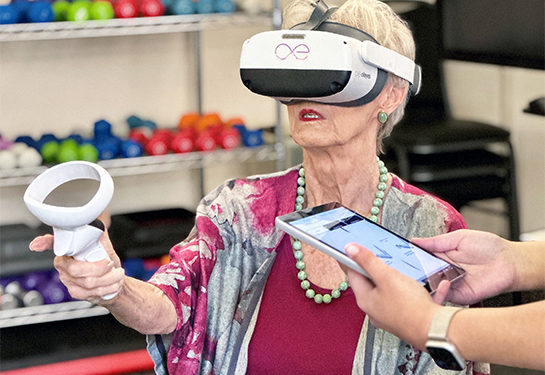Epilepsy
Epilepsy requires lifelong treatment. But with the right therapies, people with the condition can live full, active lives.
Medically reviewed by Jack Lin, M.D. on Jan. 02, 2024.

What Is Epilepsy?
Epilepsy is a brain and nervous system disorder. The main symptom of epilepsy is seizures. These occur when your brain’s normal electrical activity changes.
Specialists in our Comprehensive Epilepsy Program are experts at diagnosing and treating all types of epilepsy. Our approach to care can reduce seizures and improve your quality of life.
Our program has received the highest designation available from the National Association of Epilepsy Centers. This means we are a level 4 Comprehensive Epilepsy Center. You can be confident knowing you have access to the best diagnostic and treatment options and equipment available.
Types of Epilepsy Seizures
The main symptom of epilepsy is seizures. Epilepsy seizures occur when there’s an electrical disturbance in your brain. The type of seizure and the symptoms it produces depend on which part of your brain is affected.
Generalized Seizures
Generalized seizures involve both sides of your brain at the same time. During this type of seizure, a person may lose consciousness, fall down or experience twitching or jerking muscle contractions. There are six types of generalized seizures:
- Absence seizures (previously called petit mal seizures) are characterized by loss of awareness and blank staring.
- Atonic seizures cause muscle weakness or lack of muscle control.
- Clonic seizures involve convulsions and uncontrolled muscle jerking.
- Myoclonic seizures last only a few seconds and include muscle twitching or jerking.
- Tonic-clonic seizures (previously called grand mal seizures) involve a combination of muscle stiffness, convulsions and loss of consciousness.
- Tonic seizures cause involuntary muscle stiffening.
Focal Seizures
Focal seizures (also called partial seizures) affect only one section of your brain. Symptoms of focal seizures can include twitching, confusion, blank staring or changes in your sense of taste, smell or hearing. There are two main types of focal seizures:
- Focal onset aware seizures do not cause loss of consciousness.
- Focal onset impaired awareness seizures can cause reduced awareness of your surroundings or loss of consciousness.
Causes of Epilepsy
Injuries and conditions that affect your brain can lead to epilepsy. But for about half of people living with epilepsy, we cannot identify a specific cause.
Brain Injury
A head injury can damage areas of your brain, which can lead to seizures.
Lack of Oxygen to Your Brain
If your brain is deprived of oxygen (such as during a heart attack or childbirth), it can lead to the development of epilepsy.
Stroke
Bleeding in the brain can disrupt electrical pathways in your brain and cause seizures.
Structural and Developmental Abnormalities of the Brain
Certain developmental disorders, such as cortical dysplasia in which the top layers of the brain have abnormal organization, increase the risk for epilepsy.
Risk Factors for Epilepsy
There are several risk factors that may increase the likelihood of developing epilepsy. These can include:
Autism
Epilepsy is more common in people who have autism.
Birth Defects That Affect Your Brain
During fetal development, abnormalities in the brain or blood vessels can increase the risk of epilepsy.
Congenital Conditions
Being born with conditions such as cerebral palsy or Down syndrome increases a person’s risk of epilepsy.
Genetics
Having a relative with epilepsy can make it more likely that you will develop the condition.
Late-Stage Alzheimer’s Disease
Changes that occur in the brain of someone with dementia can increase their risk of developing epilepsy.
Epilepsy Diagnosis and Testing
Our advanced diagnostic equipment allows us to quickly and accurately identify the types of seizures you're having. We use a variety of brain-imaging technologies — including MRI, PET-CT, and SPECT (single-photon emission computed tomography) — to see where seizures are happening in your brain.
Diagnosing epilepsy takes a team approach. Our epilepsy experts work closely with the Clinical Neurophysiology Laboratory. Our highly skilled technicians use electroencephalography (EEG) to track electrical activity in your brain.
Check out our Comprehensive Epilepsy Program for diagnosis and treatment
Epilepsy Treatments at UC Davis Health
After careful diagnosis, your epilepsy care team puts together a customized treatment plan made just for you. Our goal is to improve your quality of life and give you freedom from seizures. Treatment options for epilepsy include:
Medications
Anti-seizure medications are typically the first line of defense for treating epilepsy. About 70% of people with epilepsy are able to control their seizures using medication.
Devices
We use implanted devices to stimulate brain cells and change brain patterns to help prevent seizures.
Surgery
When medication doesn’t work to control seizures, surgery may be an option. Our advanced surgical techniques offer a potential cure for many patients.
Diet Changes
There’s some evidence that a ketogenic diet (high fat, high protein and low carbohydrate) can reduce seizures.
Preventing Epilepsy
There are some steps you can take to reduce your risk of epilepsy. These include:
Avoid Head Injuries
Trauma to the brain is one of the causes of epilepsy. Taking steps to protect your head (such as wearing a helmet while biking and skiing) is important.
Get Good Prenatal Care
Sometimes, complications during pregnancy or birth can lead to epilepsy. Staying healthy and working with your health care provider throughout your pregnancy can reduce those risks.
Reduce Risk of Heart Disease
Strokes can cause epilepsy. Reducing your risk of heart disease — watching your cholesterol and blood pressure, exercising and eating well — can help prevent strokes.
"Epilepsy and Seizures," National Institute of Neurological Disorders and Stroke, https://www.ninds.nih.gov/health-information/disorders/epilepsy-and-seizures#toc-who-is-more-likely-to-have-epilepsy-and-seizures-
Who does it affect?
3.4MPeople in the U.S.
Medication alone can’t control seizures in
1/3Of adults with epilepsy
Source: Centers for Disease Control and Prevention (CDC): Epilepsy Fast Facts
Request an Appointment
As Sacramento's No. 1 hospital, you'll benefit from unique advantages in primary care and specialty care. This includes prevention, diagnosis and treatment options from experts in 150 specialties.
Referring Physicians
To refer a patient, submit an electronic referral form or call.
800-4-UCDAVIS
Patients
Call to make an appointment.
Consumer Resource Center
800-2-UCDAVIS

Ranked among the nation’s best hospitals
A U.S. News & World Report best hospital in cardiology, heart & vascular surgery, diabetes & endocrinology, ENT, geriatrics, neurology & neurosurgery, and pulmonology & lung surgery.

Ranked among the nation’s best children’s hospitals
U.S. News & World Report ranked UC Davis Children’s Hospital among the best in pediatric nephrology, orthopedics*, and pulmonology & lung surgery. (*Together with Shriners Children’s Northern California)

Ranked Sacramento’s #1 hospital
Ranked Sacramento’s #1 hospital by U.S. News, and high-performing in aortic valve surgery, back surgery (spinal fusion), COPD, colon cancer surgery, diabetes, gynecological cancer surgery, heart arrhythmia, heart failure, kidney failure, leukemia, lymphoma & myeloma, lung cancer surgery, pacemaker implantation, pneumonia, prostate cancer surgery, stroke, TAVR, cancer, orthopedics, gastroenterology & GI surgery, and urology.

The nation’s highest nursing honor
UC Davis Medical Center has received Magnet® recognition, the nation’s highest honor for nursing excellence.

World-class cancer care
One of ~59 U.S. cancer centers designated “comprehensive” by the National Cancer Institute.

A leader in health care equality
For the 13th consecutive year, UC Davis Medical Center has been recognized as an LGBTQ+ Healthcare Equality Leader by the educational arm of America’s largest civil rights organization.

